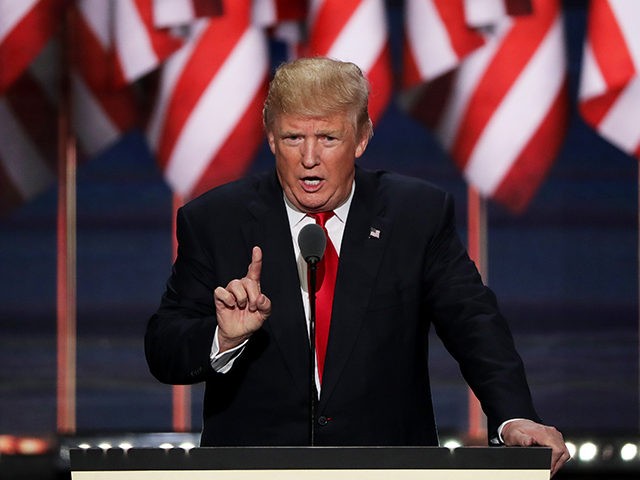Donald Trump issued a stern warning to the Beijing regime in his acceptance speech. He said he would stop China’s “outrageous theft of intellectual property,” “illegal dumping” and “devastating currency manipulation.”
Trump knows what most Americans have missed, namely, that over the past few months China’s leaders have engineered a sharp decline in the value of the country’s currency. Ever cheaper Chinese-made goods are being dumped into the world’s markets, and are flooding into the U.S. at an alarming rate.
Since the beginning of the year, the yuan has fallen at an annualized rate of 12 percent. As a result, the U.S. trade imbalance with China has reached record proportions. Unable to compete with these artificially low prices, U.S. factories are closing and the jobs that they provided to middle-class Americans are moving overseas.
Even international bankers are crying foul, asserting that China has violated its “solemn pledge” to keep its exchange rate stable. Mark Williams, chief China economist at Capital Economics, fumes that “This makes a mockery of the People’s Bank of China’s suggestion that its policy is to keep the currency’s value stable.”
But it wasn’t just the PBOC that broke its “promise.” It was China’s number two, Premier Li Keqiang, who repeated reassured the world that “China will not rely on currency depreciation.”
I understand Williams’ anger—he and others who relied upon these empty promises to bet on the stability of the yuan have lost money. But I wonder where they have been for the past 30 years. China has systematically kept the yuan artificially deflated—and systematically lied about it—for a generation or more. Why would they not continue?
And why would anyone take the assurances of China’s Communist Party leaders on this or any subject at face value?
Premier Li and President Xi Jinping may sometimes wear Western suits and ties, but they have not adopted Western values. They run a ruthless regime that routinely rounds up human rights activists, forcibly aborts women who are pregnant without permission, and executes more people than the rest of the world combined. They continue to believe that “socialism with Chinese characteristics” is superior to Western democracy, and are firm in their belief that China will one day rule the world.
China was admitted to the WTO, the World Bank, and the IMF after promising to play by the rules of the existing international order. But the history of the past few decades makes it clear that it never intended to.
Instead, China’s tough-minded Communist leaders have consistently pursued a “beggar-thy-neighbor” policy in order to move as much of the world’s manufacturing base to China as possible. As China expert Michael Pillsbury has noted, China’s leaders are determined to dominate the world in the decades to come, and are willing to do whatever it takes to reach that end.
Whether that means stealing intellectual property, monopolizing strategic resources, bribing foreign officials, or even crippling the world’s economy by currency manipulation, is all the same to them, as long as China gains a competitive advantage in the process.
China’s main contribution to the international organizations it has been allowed to join is arguably to corrupt them. You might as well invite the Godfather to join the Harvard Club on the theory that, if he is allowed to sip sherry with its members, he will be moved to abandon his life of crime.
One presidential candidate gets it. The other, who has taken millions of dollars in Chinese money over the years, frets that China might stop subsidizing her plans to continue to spend beyond her—and our—means.
Trump promises to defend American jobs and industries. Clinton pleads with China to “keep buying our debt.”
Which candidate do you think China prefers?
Steven W. Mosher is the President of the Population Research Institute and the author of the forthcoming The Bully of Asia: China’s Long March to World Dominance.

COMMENTS
Please let us know if you're having issues with commenting.